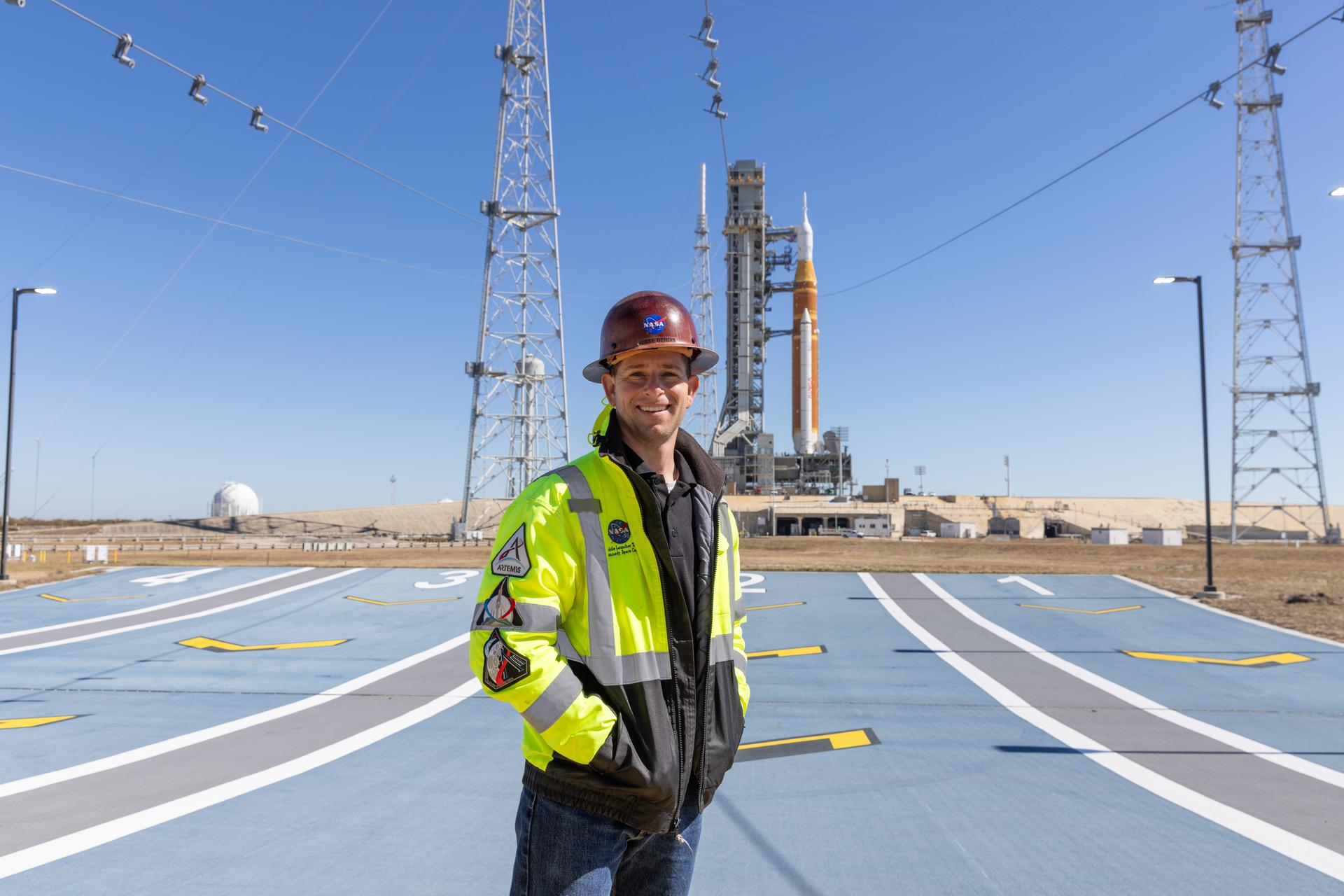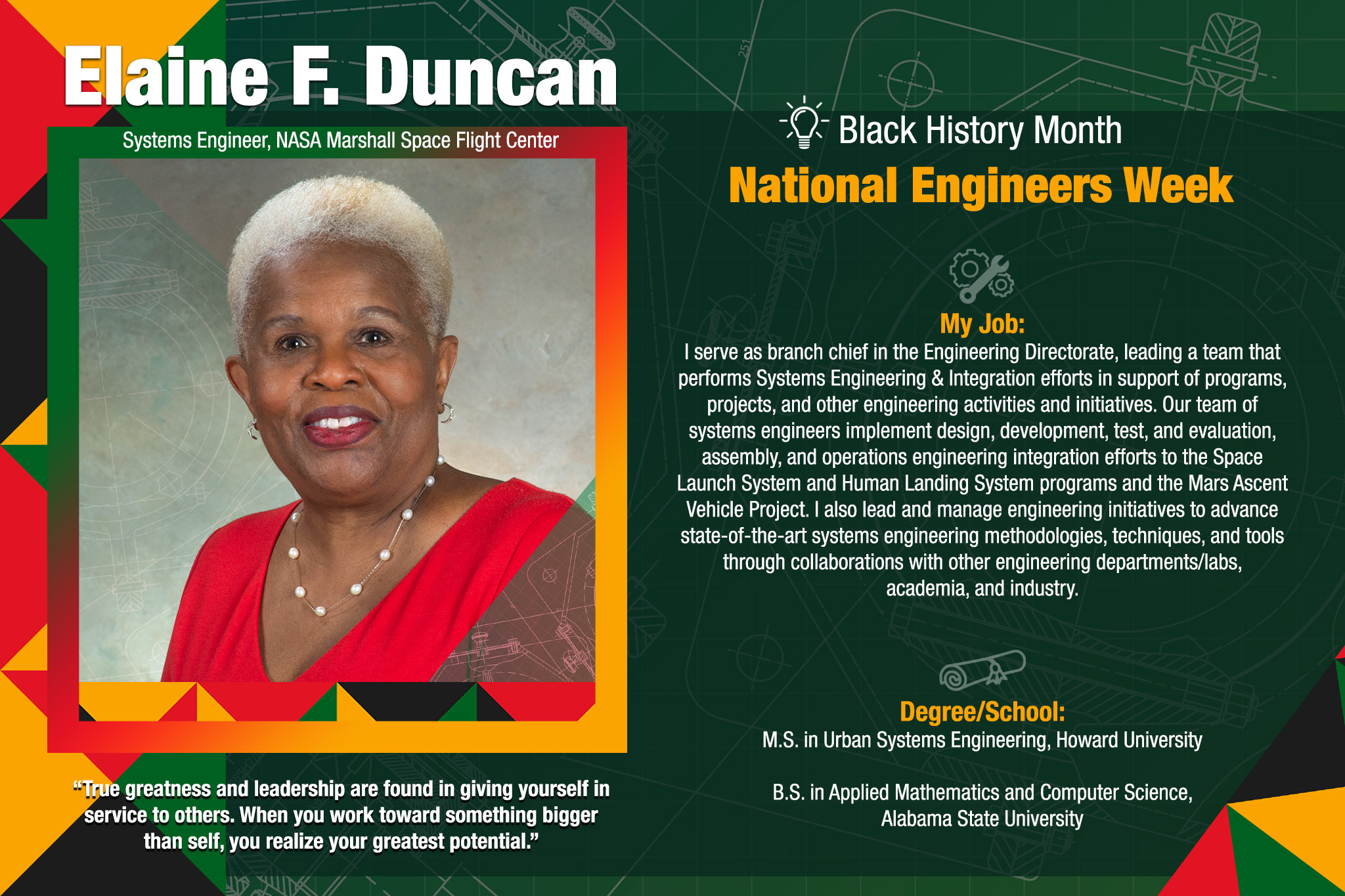Elaine Flowers Duncan is a supervisory aerospace flight systems engineer with a Master of Science degree in urban systems engineering from Howard University and a Bachelor of Science degree in applied mathematics and computer science from Alabama State University. She has worked at NASA Marshall Space Flight Center for 40 years.
What is your job and how do you support the NASA mission?
I serve as branch chief in the Engineering Directorate’s Technical Management Branch, leading a team that performs Systems Engineering & Integration efforts in support of programs, projects, and other engineering activities and initiatives. Our team of systems engineers implement design, development, test, and evaluation, assembly, and operations engineering integration efforts to the Space Launch System and Human Landing System programs and the Mars Ascent Vehicle Project.
I also lead and manage engineering initiatives to advance state-of-the-art systems engineering methodologies, techniques, and tools through collaborations with other engineering departments/labs, academia, and industry.
Who or what inspired you to choose your career and why?
In college, I didn’t know what I would do with a degree in mathematics other than teach. Dr. Maryland, my math advisor, recommended I participate in a student internship at the Brookhaven National Laboratory in New York. At Brookhaven, I met many world-renowned mathematicians and engineers working on solutions to real life problems, like minimizing the amount of waste on streets in New York cities. This is where I was first introduced, and became interested, in the concept of systems engineering, back in 1976.
What do you love about being an engineer with NASA?
I love the fact that being an engineer with NASA provides opportunities to expand my narrow understanding of the world beyond my humble beginnings in Montgomery, Alabama, the place I call home. Now, I’m supporting the Space Launch System and Human Landing System, which will send the next man and first woman to the Moon and expand human space exploration to Mars.
What do you find most challenging about your job?
The most challenging part of my job is managing the dynamics of the programs we support and the impacts they have on my team – the Human Element. The technical elements come easier than the Human Element. This is also the most rewarding part of my job. It stretches and develops me in my personal pursuit to understand and appreciate the differences as well as the connectedness we share as humans.
From your experience, what do you feel are the most important qualities a leader should have to be successful?
Based on personal experiences, the most effective leaders must have a servant attitude and a genuine interest in and commitment toward the people they lead to perform the roles and responsibilities to accomplish the mission. Our people are our most valuable resources and must be treated as such to make us truly successful. To be a successful leader, I also surround myself with people who are smarter than I am to implement steps in making the vison a reality.
What’s the most important risk you took and why?
One risk I immediately recall is one that potentially could have set back the advancement of my career. I accepted an opportunity to participate in the NASA Administrator’s Fellowship Program (NAFP), which required a personal commitment of two years away from the center. The program’s objective was to increase the capabilities of HBCUs (Historically Black Colleges or Universities) and other minority universities to participate in NASA’s research and development programs to help expand their STEM (science, technology, engineering, and math) disciplines.
I was told by a mentor, for whom I had the highest respect and trust, that being away for two years was very risky, and I would have to start my career all over upon my return. Well, I assessed the risk to my career advancement and the impact I could make to support the development of our future STEM workforce and decided to accept the fellowship.
Participation in NAFP allowed me to serve as the first instructor/professor of a new graduate course of systems engineering and project management at HBCU Alabama A&M University. I was also instrumental in the success of the first three graduate students to receive a Master of Science in systems and materiel engineering from Alabama A&M. I returned to NASA and went on to advance in my career.
As a leader, how do you keep your team motivated, especially when there is conflict or obstacles?
As a leader, my goal is to always be open and transparent with my team. I often remind my team that family is always first and, as a team, we are expected to step up and share the load when necessary, realizing no one is consistently an “A” player. I also remind them to expect tough days, and they are ok, encouraging flexibility and adaptability.
I provide guidance to my team to realize when “good is good enough” and that there is no such thing as a perfect product and/or service. Our goal is to always deliver timely and quality products and services, but not at the expense of safety, health and family. I also try to motivate and boost morale by giving time off, monetary awards, and supporting telework. The present COVID-19 pandemic has proved that telework does not adversely impact the delivery of our products and technical service and, in many ways, improves productivity.
What do you enjoy doing outside of work?
I serve as a volunteer board member for non-profit organizations, serving at-risk youth. Most of my spare time is spent serving as a volunteer member of the Madison County Juvenile Conference Committee (JCC), which is a program designed to divert juveniles charged with first or second-time minor offenses, and acts as a community-based arm of the Family Court. I am a volunteer, appointed by the Family Court Judge to serve in a confidential setting on the Madison City JCC panel to hear and decide matters involving alleged juvenile offenders.
I also provide community service as a member of Delta Sigma Theta Sorority, Inc.; serve on the College of STEM (science, technology, engineering, and math) Advisory Board at Alabama State University (ASU); and serve as a mentor and coach to local STEM students at Alabama A&M and virtually to students at ASU and Howard University. Previously, I have served as a Girl Scout troop leader and Brownie troop leader at my church.
You graduated from an HBCU (Historically Black College or University). Why was this important and what was most meaningful about your experience?
Yes, I attended two HBCUs, Alabama State University, undergraduate, and Howard University, graduate. I owe my life, personal value system, and professional career to my HBCUs. I am forever indebted to my HBCUs. Without an HBCU, I would not have received higher education. At my HBCUs, I was treated as family and all professors took a personal interest in me, ensuring I was successful in my studies. I was challenged, while being encouraged and cheered along the way.
I was awarded the Dr. Martin Luther King, Jr. Scholarship by the Montgomery Improvement Association (MIA) to attend ASU and major in mathematics. MIA was an organization with the objective of improving the conditions of Black communities and race relations in Montgomery.
One of my most meaningful experiences while at ASU was supporting MIA’s mission, which included but was not limited to the Montgomery Bus Boycott campaign, as an active student member. I was influenced by Mrs. Johnnie Carr, a close friend of Rosa Parks, who was the second president, coming after Dr. King. She always emphasized the importance of education to lift poor people out of poverty and eliminate ignorance, the root cause of poverty and racism.
Do you think diversity and inclusion are important for NASA to achieve success?
Diversity and inclusion are critical necessities/requirements for survival of all organizations, including NASA to achieve success. The things we do at NASA are very difficult and require not just the inclusion, but also the utilization of thoughts from all communities to be successful.
Our varied cultures, ethical backgrounds, family, religion, race, genders, learning, and life experiences (etc.) all shape and influence our values, along with the way we think, process information/data, resolve problems, and make decisions. These differences are what’s needed to build, maintain and sustain what we do to deliver the best products and services to achieve success.
In February, we celebrate Black History Month. Who has inspired you the most in Black history and why?
There are countless Black History hidden figures who have inspired me, including my teachers who saw something in me at an early age; the numerous mid wives, including my great grandmother and aunts who delivered babies in and around Montgomery; and surrounding Black belt counties.
Also, my parents, who did not graduate high school, instilled in my siblings, and me, the value of education; my sister, Dr. Mary A. Flowers, a Harvard University Medical School graduate, the first and only college educated medical doctor in my family; Ms. Claudette Colvin, the teenager before Rosa Parks, refusing to give up her seat on a bus in Montgomery; Mrs. Johnnie Carr, close friend of Rosa Parks and president of the Montgomery Improvement Association, who along with my parents, taught me that education was way out of poverty and ignorance.
What advice would you give young people who might be interested in pursuing a career in STEM (science, technology, engineering, and math)?
Study hard, develop close relationships with professors, register with the university career development office, stay focused, and seek internships to get hands-on work experiences outside the classroom, even if graduation is delayed. Also, find a mentor you can trust and don’t be afraid to ask someone to mentor you. Remember to always reach back to others in your community to serve as a coach and mentor to inspire someone.




























